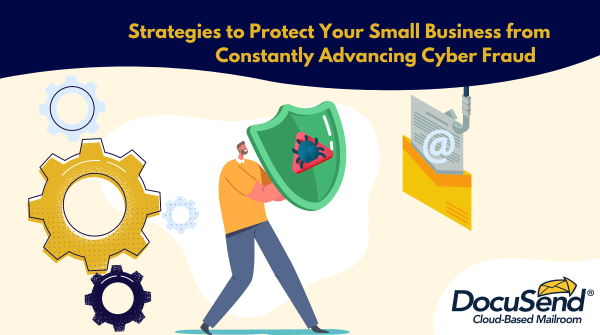Strategies to Protect Your Small Business from Constantly Advancing Cyber Fraud

Experiencing a scam is dreadful. Scams and cyberattacks have become an unfortunate reality for businesses, regardless of their size or online presence. As technology continues to advance, hackers and scammers are constantly finding new ways to exploit vulnerabilities and target unsuspecting businesses and organizations. It's crucial to be aware of their tactics to protect yourself. Every year US businesses lose hundreds of millions because of phishing scams, and the amount of money they are losing is growing yearly. That’s why cybersecurity is an ongoing process, and staying vigilant is so important.
Some time ago, it was relatively easy to recognize schemes aimed at stealing personal information or money, as they were less sophisticated and more straightforward. For instance, you might have received a sudden email from a supposed long-lost relative in an unfamiliar country, accompanied by an absurd and poorly written request to provide sensitive information or wire them some funds.
As the internet and technology evolved, so did the tactics used by scammers. The complexity and diversity of modern cyber threats require users to remain cautious to protect their personal information and finances. Scammers may use social engineering tactics to manipulate individuals. For example, an employee within your company might receive an email that appears entirely legitimate from another company, or engage in a phone conversation with a person claiming to be a representative, only to realize later that they've been deceived into disclosing sensitive information or making unauthorized payments.
It's terrifying to hear, right? But there’s no need to be overly anxious about it. Equipped with knowledge and taking proper measures such as employee training, regular software updates, strong access controls, encryption, and continuous monitoring, you can safeguard your business from even the most advanced scammers. While no security measure is foolproof, a combination of knowledge and proper precautions can significantly reduce the risks. Let’s talk about some popular tactics used to deceive individuals and businesses and exploit their vulnerabilities.
Be cautious: Recognize Common Cyber Scams That Deceive Small Businesses
A strong defense begins with understanding your enemy’s tricks and strategies. You will make significant strides toward achieving security and peace of mind through educating yourself and your business team about these prevalent hacker schemes.
1. Phishing
The term "phishing" originates from "fishing," wherein scammers use deceptive tactics like fake emails, messages, or websites as bait to lure unsuspecting victims into falling for their tricks.
This hacking tactic originated back in the 90s. Hackers bait their victims through email, websites, or apps to click on a link that will unlock access to their personal or company data.
Certain phishing scams are obvious right from the start, such as an email from “PayPal” with grammatical and spelling errors. Typically, such emails are automatically directed to your spam folder. But phishing attacks often involve emails or messages that appear to be from legitimate sources, such as banks, government agencies, or well-known companies.
Even your accounting software might be at risk (to know more, read: Cyber scams target small businesses through their accounting software).
A tactic called “Spear phishing” is even more intricate and invasive, because while phishing targets wide audiences, spear phishing is focused on specific companies or individuals. For example, someone impersonates the CEO of your company and directs your accountant to process the payment for a fraudulent bill.
2. Bogus Bills for Fake Services
Sometimes scammers deceive you into paying for things you didn’t even purchase.
They can do it in a few ways, and the first is by just sending you a fake invoice. Always ensure that your invoices are genuine, because hackers might impersonate a company whose services you usually use but modify the banking information on the invoice.
Therefore, it's essential to verify the accuracy of the payment details before processing any transaction. Another trick is claiming certain fake charges from the name of the company you work with, such as domain name renewal.
There is a common scamming tactic when cyber criminals approach unsuspecting website owners, claiming to offer services to enhance their website's SEO or provide other services.
They might even perform some minimal work to gain trust, but then overcharge for the services and disappear, or create a sense of dependency then threaten to harm the website if payment stops.
3. Compromised Credentials
Due to significant data leaks like the ones that frequently make the headlines, both individuals and companies have experienced compromised login credentials. Hackers may get sensitive information from one website and gain unauthorized access to another site with its help.
How can this affect small businesses? If a hacker manages to pilfer the login credentials of someone in your team and use them to buy or redeem products that can be resold, your business faces the risk of financial loss. And if your website stores any login information and experiences a security breach, the hackers may gain unauthorized access to user accounts, which can lead to various problems for both the website owner and its users and catastrophic reputation loss for your business. You may have to engage in damage control for your website users, which involves notifying affected users about the breach, advising them to change their passwords, and investigating the extent of the hack.
When handling sensitive data, it is highly probable that you will utilize a third-party application or service. In such cases, you should carefully select services that are consistently secure and reliable. At DocuSend, we have two reputable security firms to conduct regular, thorough security assessments on our system.
Victims often feel compelled to continue paying to avoid potential damage. That’s why it’s important to search out more information and verify the legitimacy of service providers before engaging in any financial transactions with them.
Tips to Avoid Cyber Scams
As a small business owner, it falls to you to guarantee the security of all your transactions, be it with customers or vendors. The FTC has some good tips to protect your business.
1. Safety Protocol for Employees
Because even one single accidental click can jeopardize all your business's security, every employee handling sensitive information should receive training on cyber scams.
In any case, sending passwords or other sensitive information via email should be avoided. If an unauthorized person gains access to the email account, they could easily obtain sensitive information. Additionally, email is not encrypted by default, which means the content can be potentially read by anyone with access to the email servers or network.
There is a way to email sensitive information via encrypted secure links with the new generation of email solutions when the recipient receives a secure link to the sensitive document. You can also consider tools like encrypted messaging platforms and secure file-sharing services to ensure the confidentiality of the information being shared.
If employees see anything suspicious, they should communicate it to their colleagues, as hackers might send the same emails to them too.
Providers should only be able to send you a newly generated password, not provide you with your current one. You and your team must understand that if a provider is able to tell you your password, they are storing it improperly.
2. Procedures for Payments
Having a verification procedure for every payment processed is essential to detect and prevent payment fraud. Scammers can be very cunning and may only alter the banking number on an otherwise authentic-looking invoice, so you need to thoroughly review every invoice, even from trusted companies, to ensure its accuracy and legitimacy, reducing the risk of falling victim to fraudulent payments. Payment verification procedures act as an additional layer of security to confirm the authenticity of the payment request.
Limit the number of authorized personnel for making payments, particularly for significant expenses, and ensure that they follow the same verification procedure. By limiting access to a select few trusted employees, it becomes easier to monitor and track payment activities. As part of your payment verification procedure, you or your employees should question certain methods of payment. Wire transfers and gift cards are difficult to trace and are frequently used by scammers.
3. Thorough Examination and Technical Competence
To comprehend the dynamics of modern business operations, it is worthwhile to devote your time and effort to undergo technical training. If you operate a business, not being tech-savvy no longer serves as an excuse, because the majority of communications and transactions take place online. Don’t worry, this doesn’t imply that you must code your own website!
However, here are some security measures you should take for your business:
- Implement strong password policies and changing your passwords periodically, as well as fostering a culture of password updates among your employees.
- Ensure the security of all sensitive files, financial information, and passwords. Double-check that you have a secure connection and a legitimate recipient whenever sharing sensitive information like login credentials. Ensure that websites accepting payments use encryption, as it is crucial to protect sensitive information in transit. Conduct sensitive online transactions only over a secure wireless network and avoid Wi-Fi hotspots. Keep software and applications, and your company’s website, up to date to protect against vulnerabilities.
- Engage solely with trusted and verified vendors. Never trust unsolicited emails! Verify the authenticity of all email requests, especially for financial transactions.
- Regularly back up critical data to prevent data loss in case of cyber incidents.
- Conduct periodic security audits and risk assessments to identify weaknesses.
In contrast to emails, the United States Postal Service operates under numerous federal laws and regulations. Due to the rise of online scams, it is to be expected that people and companies opt to receive sensitive communication, like invoicing, through a traditional method: via mail.
Using DocuSend, you can securely send sensitive information such as billing and customer details through the mail or email with just a few mouse clicks. You can rest assured that your business transactions are protected from scammers. Try it free now!

